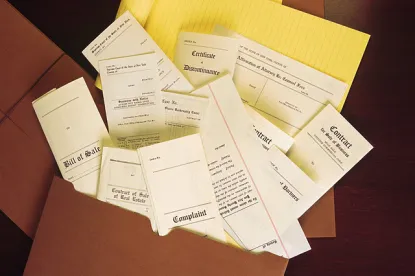The idea that certain documents, materials, and communications are privileged from discovery is well-known. Indeed, under Rule 26 of the Federal Rules of Civil Procedure, for example, documents and materials prepared by or for an attorney in anticipation of litigation are privileged and are thus exempt from discovery by opposing parties. While many are aware that this privilege—which is commonly referred to as the work-product doctrine—exists, its scope is often unclear, and deciding whether the privilege applies can be a difficult task. That is, in any given case, whether a certain document was prepared "in anticipation of litigation" can be a question without a clear answer. As evidenced by a recent decision of the Eastern District of Louisiana in Matthiews v. Crosby Tugs, LLC, this is especially true in the context of investigative files prepared for future litigants by third-party investigative services. Matthiews v. Crosby Tugs, LLC, No. 15-05985, 2016 WL 4496713 (E.D. La. Aug. 26, 2016).
In Matthiews v. Crosby Tugs, LLC, Troy Matthiews alleged he was injured while working for Daigle Towing Services, LLC, aboard a vessel owned by Crosby Tugs, LLC. Matthiews sued Crosby Tugs (Crosby), and in connection therewith, Crosby issued a subpoena duces tecum to Aucoin Claims Service, Inc., an independent claims adjusting firm that had been retained to investigate the incident by Daigle's insurer, Allianz Global Corporate & Specialty. Matthiews sought production of the entire investigative file of the incident, which had been prepared and maintained by Aucoin. In response to the subpoena, Aucoin filed a motion to quash or, in the alternative, to modify the subpoena, arguing that documents contained within the investigative file were privileged under the work-product doctrine. After reviewing the documents in camera, the court rejected Aucoin's position, found that none of the documents were privileged, and ordered that the documents be produced within seven days.
In reaching its conclusion, the court noted the work-product doctrine "is not an umbrella that shades all materials prepared by a lawyer or agent of the client." Rather, the court reasoned that the work-product doctrine focuses only on materials assembled and brought into being in anticipation of litigation, and excluded from the work-product doctrine are materials assembled in the ordinary course of business. In further exploring this distinction, the court explained that "[i]f the document would have been created regardless of whether litigation was also expected to ensue, the document is deemed to be created in the ordinary course of business and not in anticipation of litigation."
With these principles in mind, the court ruled that Aucoin's investigative file was not prepared in anticipation of litigation but, instead, was prepared in the ordinary course of business. The court's conclusion was founded, in large part, on an affidavit submitted by Patrick Aucoin, the President and Owner of Aucoin Claims Service. In his affidavit, Mr. Aucoin stated that Aucoin was retained to monitor the injured employee's medical care and to develop a record of that medical care, "in the event of future litigation arising out of the claimed incident." Citing Mr. Aucoin's affidavit, the court reasoned it was "abundantly clear" that all of the documents Aucoin sought to withhold as privileged were created in the ordinary course of business. The court first noted that no one from Aucoin "interacted in any demonstrable way" with any attorney for any party or insurer, which, although not dispositive, served as evidence that "the primary motivating purpose behind creation of the documents was not anticipation of litigation." The court also noted that, as stated in Mr. Aucoin's affidavit, Aucoin was retained primarily to assist the injured employee in obtaining medical care and to create a "paper trail" of that care. In summary, the court concluded that "bare assertions about maintaining a maintenance-and-cure paper trial 'in the event' of possible future litigation are simply inadequate to satisfy Aucoin's burden" to establish the applicability of the privilege afforded to work product.
The recent decision in Matthiews v. Crosby Tugs, LLC, underscores the ever-important need to be aware of the scope and applicability of the work-product doctrine. Obviously, not all documents or materials created prior to trial will be privileged under the work-product doctrine, and the line between those documents that are privileged and those that are not can sometimes be a difficult one to draw. Oftentimes, an organization may, in the lay sense of the word, "anticipate" being sued in the future and, for that reason, assume that all documents and materials created thereafter will be privileged, but such an understanding is far from the truth. Organizations that find themselves in situations where litigation is expected should be wary of the possibility that their documents, materials, and communications may, even when least expected, find their way into a courtroom. It thus remains imperative for potential future litigants to act with diligence and care to ensure that documents and materials it believes are work product in fact are.



 />i
/>i

